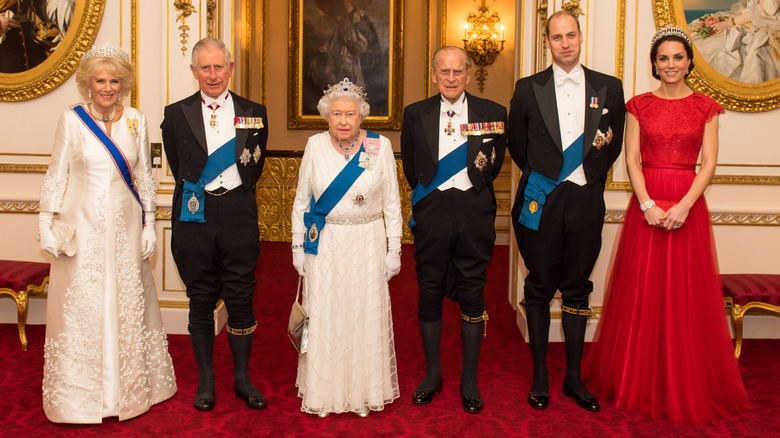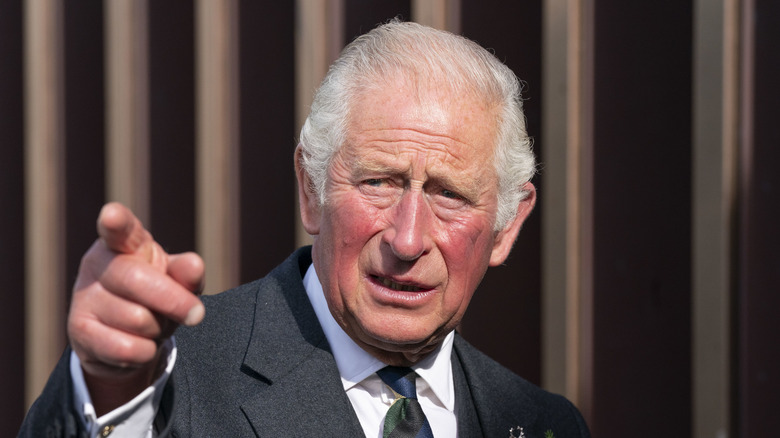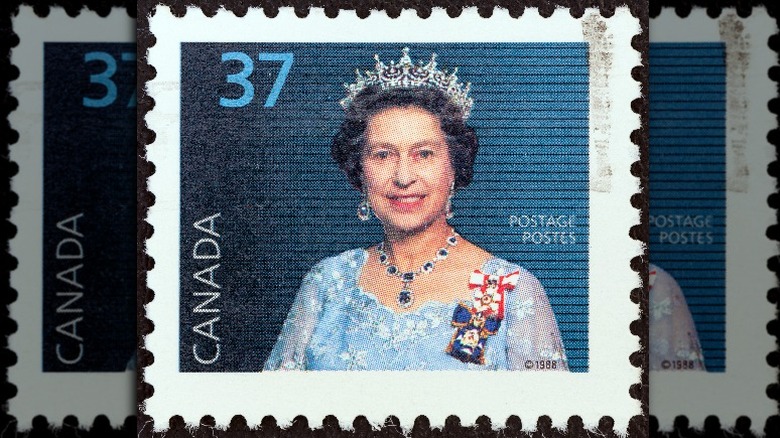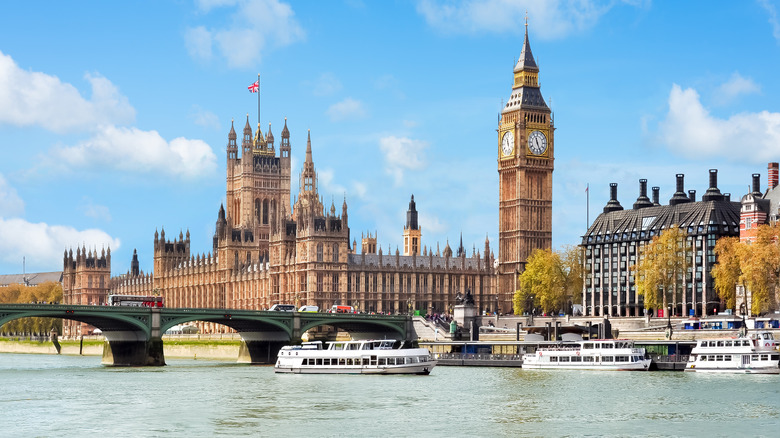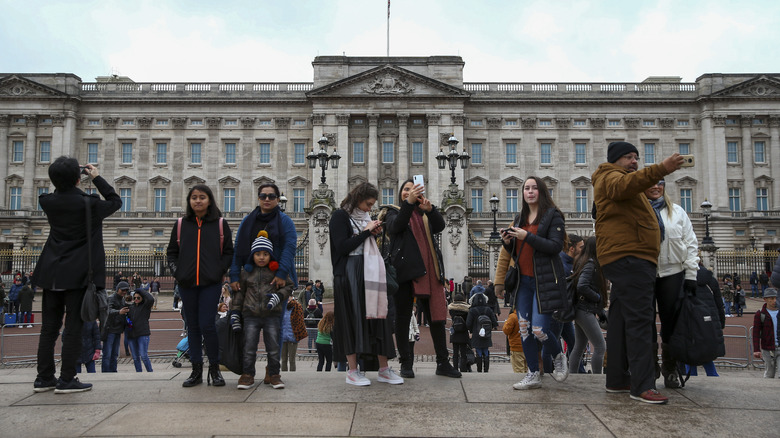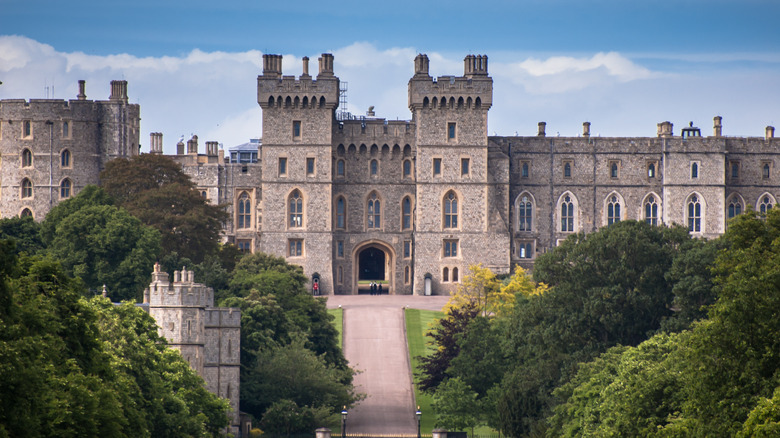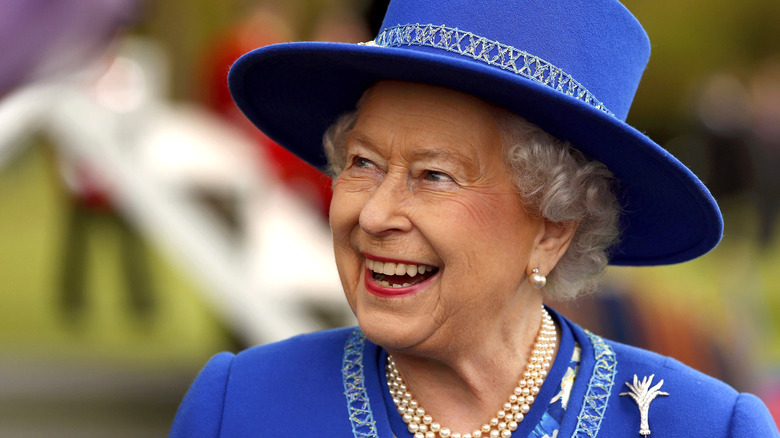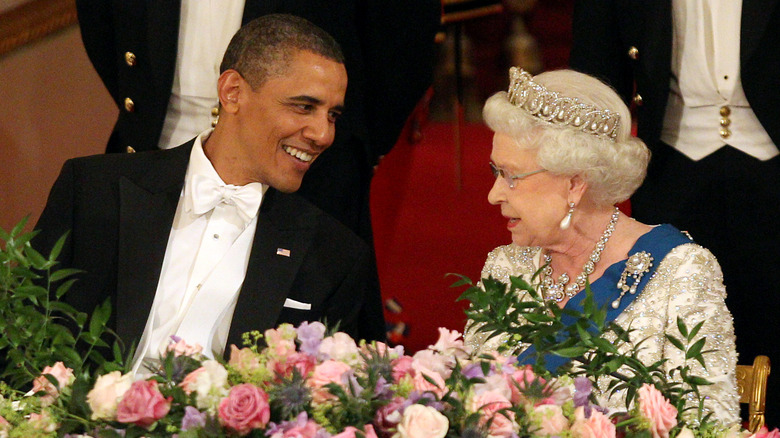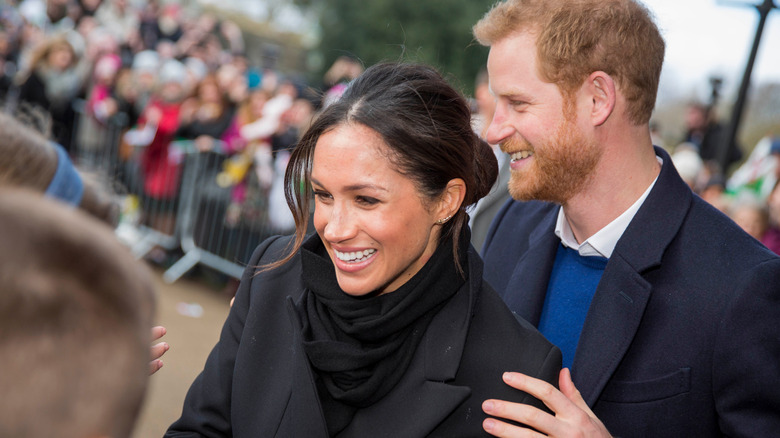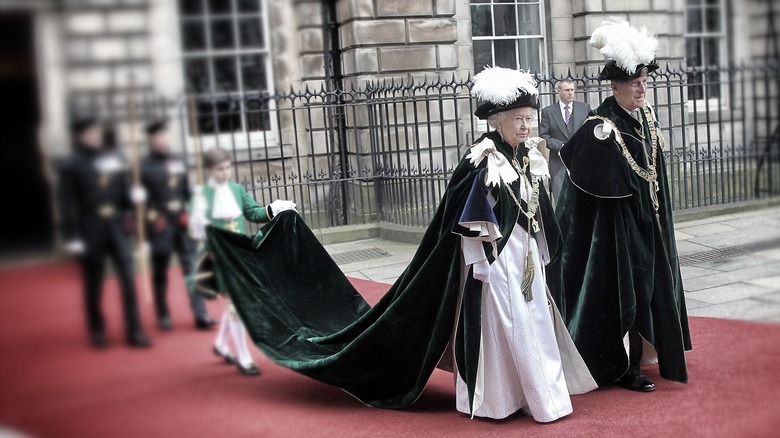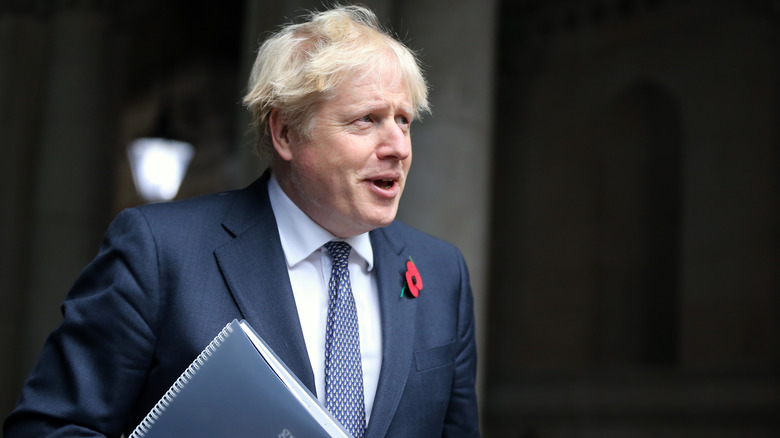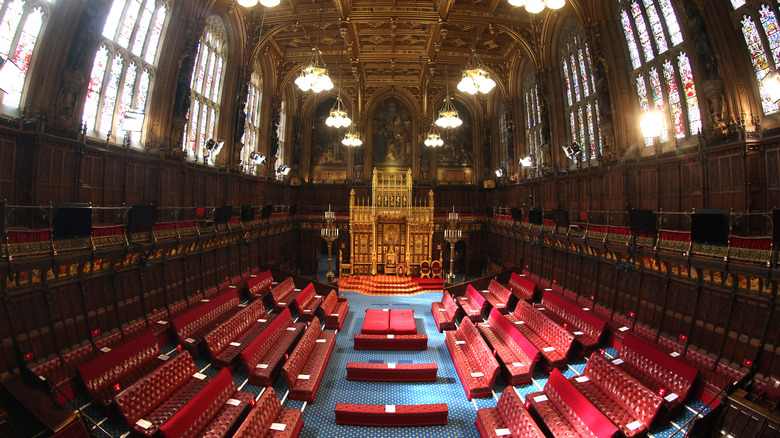Here's What Would Happen If Britain Got Rid Of Their Monarchy
If you're a fan of "The Crown" on Netflix, you know that Britain's royal family would do just about anything to remain, well, Britain's royal family. Sure, the show is a bit fictionalized, but we get the gist. The monarchy is obviously obsolete. Even the royal family knows it's obsolete. But for some reason, it just keeps on keeping on, kind of like the Jenga bricks on top just keep on keeping on as all the other ones are removed from the tower one by one.
There's always someone in the United Kingdom making noises about abolishing the monarchy. Recently, it was on an unflattering billboard proclaiming that "no man should be King." But it does seem possible that one day, Britain will finally get fed up with all the royal antics — maybe once the almost universally despised Charles is finally on the throne — and the royal family will be ousted like delinquent tenants, with all the Crown Jewels tipped out on the lawn behind them. So what happens then? Would the royal family flee to a remote French province? Would they sell the Crown Jewels on eBay? Worse, would they all have to get jobs?
The answer is somewhat subjective, but we can make some pretty good guesses. Here's what might happen if the royal family got the boot.
First of all, nobody likes Charles
Whatever you may think about all the other British royals, one insurmountable fact remains: nobody likes Charles. Well, the Queen might, and maybe Camilla, but the entire rest of the nation thinks he's a whiny little girl dog. Charles has really not done much to earn the respect of the British people — he was outright cruel to the mother of his children, he famously went to the opera while his 8-year-old son was in surgery, and he is also a prat and a twit, according to various British tabloids.
The queen, on the other hand, still enjoys immense popularity — according to Newsweek, she has a 68% approval rate, which even beats Ronald Reagan's famously high 63%. Charles, on the other hand, is so deeply unpopular that more than half his people would prefer to see the succession just skip him entirely and go straight to his son William.
Most people think the big push to abolish the monarchy will come after Queen Elizabeth II's death, and before Charles is officially crowned. The royal family, naturally, is prepared for this and rumor has it they'll make sure Charles is crowned before the Republicans make too much noise. In Britain, by the way, the Republicans are the folks who want a republic – that is, a system of government where everyone is elected, including the head of state. Does Charles have anything to worry about? Probably not. But you know it totally bugs him.
If England did it, 14 other nations would have to do it too
If you've read up on modern history or have existed as a human on this planet at any time during the last few hundred years, you know that historical Britain spent an awful lot of time and resources colonizing every country they could get their Marmite and Branston Pickle smeared fingers into. Unsurprisingly, not every nation they did this to was cool with it. During the last half a century or so, nations in the Commonwealth Realm have been backing out of the agreement they never agreed to one by one. The most recent is Barbados, which dumped the monarchy in 2020 with a simple House of Assembly vote. Once the divorce with Barbados is final, the queen will be the head of state in just 15 countries. The poor dear.
This means if England abolished the monarchy, Elizabeth would still be queen of 14 other nations including Canada and Australia. In order to completely rid her of her royal title, every nation in the commonwealth would have to vote her out, and it would be a lot easier in some nations than in others. According to Canada's National Post, in the great north the Canadian House of Commons and the Senate would both have to vote to remove her. And even if that did happen, every province in Canada would have to agree to the plan, and every province in Canada has never agreed on anything.
Also, it would take an act of Parliament
Britain couldn't just wake up one morning and go, "Right, that's it then. Off you go, Royal family. Pip pip, cheerio." Well they could, but she wouldn't, because it's just not that easy. According to Insider, it would take an act of parliament to abolish the monarchy. That means there would have to be a lot of agreement amongst people who don't usually agree with each other, and even then it would never happen. Why? Because in order to abolish Britain's monarchy you have to get the monarch herself on board with the idea — the act of parliament would have to be signed by the queen, and though it is true that the queen mostly just sits back and lets the elected government hold the reins of the nation, that may be the one thing she decides she's not willing to do.
More importantly, giving the queen and her weird family the boot would be a monumental undertaking. It would be expensive, politically costly if it were to fail, and it would be largely meaningless. The queen does officially still have certain powers. (According to Heart, she can appoint a new prime minister if the office becomes vacant, she can declare war, and she can veto bills.) But she's never used any of these powers and isn't ever likely to. Why? Because the queen is very aware that she needs to behave or one day someone might actually try to take her crown.
Great Britain might lose a tourist or two
Depending on who you ask, there are a few good arguments for not abolishing the monarchy. Some people think the tourism dollars alone make it worth having a figurehead queen. Brand Finance even made an argument for that back in 2017 when it published the Brand Finance Monarchy Report. According to their analysis, the monarchy is worth roughly £67.5 billion, but more importantly, £1.77 billion of that goes right back into the British economy, and a lot of that is because of tourism.
That seems like a compelling argument, but some experts don't think it's especially scientific. After all, who's to say people won't still visit royal palaces and other sites important to the monarchy long after the monarchs themselves are gone. India still attracts plenty of visitors to its formerly-royal buildings despite the fact that they are no longer occupied by a king. And it's not like the queen herself is welcoming tourists or anything, so it's hard to imagine that visitors would really miss her presence all that much.
Anyway, the royal family is unlikely to disappear from public life immediately after the dissolution of the monarchy. The antics of the former royals will almost certainly still make tabloid headlines. Just take Italy as an example – they abolished their monarchy just after World War II and the former royal family still squabbles over who would get to be king if Italy ever changed its mind.
Dear tenant, you have 90 days to vacate the premises
Despite what they'd probably like you to believe, the royal family doesn't own Buckingham Palace. They don't own Windsor castle or the crown jewels, either. According to Insider, these properties are owned by the Crown Estate, which is technically the property of the queen, but only while she's the queen. So when she dies, Buckingham Palace and everything else held by the Crown Estate goes to Charles, and when he gets stripped of his royal title because nobody likes him ... what then?
Well, everything would go to the government, who would likely give the former royal family an eviction notice. Politely, of course. They'd have to move out of Buckingham Palace and find a new castle to call home.
So what would become of the royal residences? Would they fall into disrepair? Would Boris Johnson move in and spend his days taking selfies of himself wearing the crown jewels? Probably not. The British government would almost certainly want to capitalize on the existence of those buildings as much as possible. They'd probably be at least somewhat mindful of the argument that tourism dollars will dry up as the former royal family vanishes into obscurity, so don't be surprised to see Buckingham Palace and Windsor Castle turned into full time tourist attractions. Bearing in mind, of course, that they are already tourist attractions, it's just that you can only visit them when the royal family isn't in residence.
What would be next for the Windsors?
When the royal family finally closes the door of Buckingham Palace behind them for good, what happens next? Will the queen, and more importantly, will Charles become homeless, begging for scraps on the streets and depending on the kindness of strangers for their next gin and Dubonnet? Will they be paupers? Of course not.
Quite a lot of the royal family's money and property belongs to the Crown Estate, but the royal family does have money and property of their own, too. According to Money, the queen by herself is worth about $520 million, much of which comes from the Royal Grant, a percentage of the profits earned by the Crown Estate that goes into Elizabeth's pocket. Similarly, Charles is worth $400 million. Prince William is worth between $25 and $40 million. Poor kid.
The queen also privately owns Balmoral Castle in Scotland (worth about $140 million) and Sandringham Estate in Norfolk (worth about $65 million). Sandringham Estate has 775 rooms and its own postcode. Balmoral Castle also has 775 rooms (evidently that's like a thing with royal palaces because Buckingham Palace has 775 rooms too). The queen also owns the 18,433-hectare Duchy of Lancaster, which includes the Savoy, some of the most valuable real estate in London. Anyway, the point is that the Windsors aren't going to end up in a motel in Schitt's Creek if they do wake up one morning and find themselves without their royal titles.
Britain would lose some of its color
One of the things that makes the British, well, British is all of the pomp. America doesn't do pomp. When someone visits the White House, everyone wears a boring suit, shakes hands in the most boring way possible, sits down in a boring office surrounded by a bunch of other boring people and talks about boring things. American politicians don't have much use for ceremony.
The British, on the other hand, often use the pomp and ceremony of the monarchy as a way of impressing important visitors. According to the BBC this is officially called a "state visit" and it's one of the queen's more important duties. At the request of the Prime Minister, the Queen basically throws a royal party for a visiting head of state, complete with fancy lunches and a banquet. The point of all this isn't really spelled out but there can be no doubt it's done to impress the visitor, with a possible side effect of that visitor becoming a lot more willing to take Britain's interests to heart.
Dissolution of the monarchy would mean an end to all that, and future Prime Ministers would have to learn to be happy with American style handshakes and boring suits around boring tables in boring offices. That would fundamentally and permanently alter Britain's political culture and the way it does business on the world stage, and it's hard to know what the real effect of that would be.
The former royals would have to get jobs
Well, no, they probably wouldn't have to get jobs. Most of them could be quite comfortable for the rest of their lives living in their 775 room castles doing nothing except watching YouTube and eating scones with clotted cream, or whatever it is that Millennials do when they have very, very rich parents. But let's be real, even people who live in 775 room castles like to get out occasionally, and most of us like to have a purpose that doesn't revolve around not being a member of the royal family.
So the younger members of the family will probably get jobs, but don't cry for them. They'd almost certainly get contracts worth millions. Since leaving the royal family, for example, Harry and Meghan have been doing just fine. In 2020, they moved into a $19.4 million home. Sure, it isn't a $140 million dollar home so it's practically a slum but hey, it's a roof over their head. Also, news.com.au says they have a $53 million deal with Spotify for ... wait for it ... a podcast, and a $198 million deal with Netflix.
So not being royal worked out just fine for Harry and Meghan, but not everyone in the royal family would be inclined to find gainful employment. Charles, for example, is in his 70s and past retirement age, although it's unclear if you can legitimately retire if you never were really employed in the first place.
It would save taxpayers money
In the Brand Finance Monarchy Report of the economics of the royal family, the authors argued that the monarchy made more money for the country than it cost. The total annual cost of the monarchy to each individual taxpayer, the authors claim, is the equivalent of about 1p a day or roughly 1.4 American cents. In less "See! The monarchy is practically free!" terms, each British citizen spends about £4.50 a year, or roughly six bucks. If you multiply that out by the total number of British citizens it's about £292 million (close to $400 million), so the amount is not as insignificant as Brand Finance wants you to believe.
If the monarchy goes away, all of that money can go elsewhere. But would it have the same return as Brand Finance says the monarchy has? That's up for debate. The answer would depend on whether the British government decides to use the money for things like housing, healthcare, job creation, and so forth, or if Boris Johnson decides to just turn it all into paper money hats or something.
Still, when you consider the other things Britain spends money on, £292 million is pretty negligible. Social protection costs taxpayers £285 billion, followed by healthcare at £178 billion and education at £116 billion. All money well spent, but it does seem a bit petty to moan about the monarchy when it doesn't even make the list of top 10 biggest taxpayer expenses.
Britain would need an elected head of state
The queen is the hereditary head of state of the United Kingdom and all the other nations in the Commonwealth Realm. This means all those countries lack the equivalent of a president. Instead, they have a Prime Minister (or something similar), but the queen is still above the Prime Minister and basically outranks everyone. There is some question as to whether or not that really matters, though, since the queen never actually uses any of her constitutional powers. According to Newsweek, she doesn't even vote — her role is entirely ceremonial — she mostly just makes speeches, greets diplomats, and sits there while the Prime Minister prattles on about all the important things the government is doing in her name.
So if the queen is no longer head of state, Britain will theoretically need an elected head of state. Or would it? Do they really need to elect someone to make speeches, greet diplomats, and sit there while the Prime Minister prattles on about important things?
Whatever you may think of the queen, she does dedicate a lot of time to her work and it's likely there would be too much of it for the Prime Minister to manage. So there would probably need to be an elected head of state. It's just that no one is really sure what that position would look like, and how much it would change the face of British politics.
They'd also have to get rid of the House of Lords
Fundamentally, the reason for abolishing the monarchy is the modern notion that political positions should not be hereditary, they should be elected. Well, the queen isn't the only hereditary politician in Britain. There's also the House of Lords, otherwise known as The Right Honourable the Lords Spiritual and Temporal of the United Kingdom of Great Britain and Northern Ireland in Parliament assembled. No, really.
Anyway, the House of Lords is the second chamber of parliament and according to the UK Parliament, it spends 60% of its time reviewing legislation and the other 40% making sure the government doesn't get out of line. It also includes 92 hereditary peers, who are people who get to be in the House of Lords because they inherited the right to be there.
Now granted, Britain has done some reforming of the House of Lords. Up until 1999 every hereditary peer (750 of them at the time) got to be in the House of Lords. The House of Lords Act changed that, and now there are just 92 seats and those people have to be elected ... by previous hereditary peers. So there's still an element of only getting to be there because your bloodline says you can be there, and that's icky. If you're going to give the queen the boot, you really have to do the same for everyone who has a hereditary position in the British government, otherwise what's the point?
